Protein powders range in price from bargain-basement to mortgage worthy, choosing between them can be difficult.
So what makes one protein powder more expensive than another? Are you paying for a brand or actual quality? For the nutrition, your body needs or a sugar supplement that will make you fat?
In this article, we're going to look in-depth at the costing of protein powders in the market and the differences in the supplements themselves. Read on to find out more.
Quick Summary
- The primary difference between budget and expensive protein powders lies in the quality of ingredients, manufacturing processes, and nutritional efficacy.
- Expensive protein powders often contain higher quality ingredients, undergo rigorous testing, and are backed by solid research, justifying their higher cost.
- According to Spoon University, the presence of artificial flavors, coloring, sweeteners, and thickeners like carrageenan or guar gum in protein powders are indicators of lower quality.
- In my opinion, investing in higher-quality protein powders is worthwhile for better results and assurance of product efficacy, despite the higher cost.
Pros And Cons Of Cheap Protein
If you're new to protein powders or hesitant about which one to choose, you might lean towards the more affordable options. But what exactly are you getting with these budget-friendly choices?
When I first started my fitness journey, I too was drawn to the more affordable protein powders. It's tempting to save some bucks, but it's essential to understand what you're truly getting with these budget-friendly options.
Pros
1. Cost Savings
When pricing how much a protein powder costs, we will usually work it out per serving, not by the gram, with the most common price being $0.6 to $0.8 a serving. The average or mean cost is higher, dragged up by the premium end of the market to $1.32 a serving.
We will use the most common price bracket as the bench pole and say that cheap protein powder will be on the lower end or less expensive than the most common price of $0.6 to $0.8 a serving.
This will obviously mean that you will be saving money in the day by day compared to most other protein powders on the market.
2. Longevity
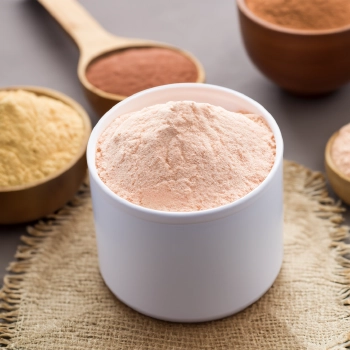
Bulk buying and monthly subscriptions can help reduce the cost per serving. Many companies offer discounts for repeat orders, making even premium powders more affordable. However, ensure the chosen powder aligns with your nutritional needs before committing.
Cons
1. Undesirable Ingredients

It should come as no surprise that some lower-end products may be filled with less than ideal ingredients with little to no nutrition or value for your body.
Artificial flavors or coloring, sweeteners, and thickeners such as carrageenan or guar gum are all telltale signs of poor quality protein powder, according to the Spoon University [1]. You want to limit your intake of carbs, sugar, and fat if you want to gain lean muscle mass.
Research the ingredients that go into your protein powder; some may just be added to create the illusion of a more robust recipe with no actual practical benefit, others may be outright harmful or just empty carbs and fat.
2. Poor Quality
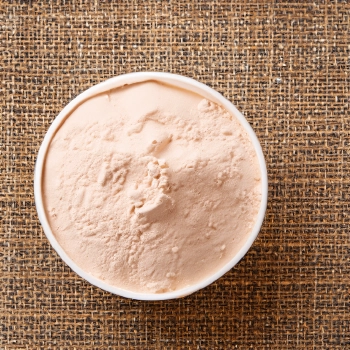
By paying more for your protein powder, you would like to assume that a lot of money gets put into research, quality control, and fine-tuning the supplements themselves.
Having experimented with various brands over the years, I've realized that when you invest more in your protein powder, you're often paying for the extensive research, quality control, and meticulous formulation behind the product.
This means by paying less, you may be getting a product that has had little to no practical testing, hasn't been vetted or approved by the appropriate officials, and worse, cannot guarantee results.
"You can buy cheap things or splurge on the best. In either case, there's a trade-off, and protein powders are no exception."
- Barry Lumsden, Writer for Relentless Gains
Companies and brands that believe in and can prove the merit of their products usually back this up with a money-back guarantee or some form of assurance. You will not likely find this in the lower-priced products.
3. Type Of Protein
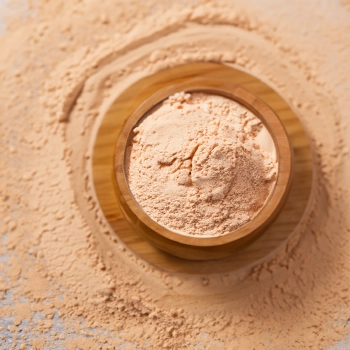
From my own experience, I've noticed that the real value in a quality protein powder lies in its protein content and the specific type of protein it offers.
While hemp, whey, and soya are all complete proteins in themselves boasting a full essential amino acid chain, others need supplementation to form a complete BCAA.
Whey concentrate and whey isolate have been the most popular forms for a long time now, and while people are beginning to look elsewhere, it is still the cheapest and most commonly used.
Whey, however, can be hard to digest, and if you have any gastrointestinal issues taking your protein powder, you might be better served choosing powders that source their protein from plant-based ingredients. Here's how to choose the right protein powder for you.
Related Posts:
4. Low-Quality Ingredients
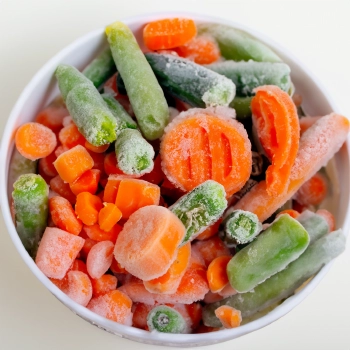
Lower production costs will also likely affect the quality of the ingredients that you would expect to find in your protein powder.
Whether it be the form they come in, how they are sourced or their freshness, this can all affect the efficacy of your chosen protein powder. It's also a little harder to conclude.
While two products might both have the same essential ingredients listed on their label information, one could be freeze-dried and the other blended practically straight from the source, so they are not necessarily equal. Essentially, the less processed and the more refined, the better.
Pros And Cons Of Expensive Protein
Paying a premium for protein powder often comes with expectations of higher quality. However, it's essential to research and understand what you should expect from top-tier products.
Pros
1. High-Quality Ingredients
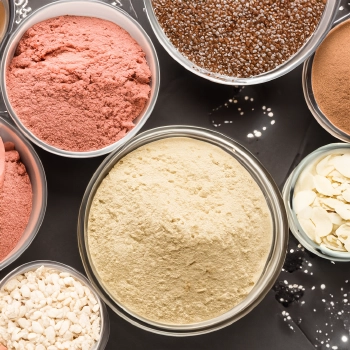
Higher-end protein powders typically use premium ingredients, resulting in less processing and fewer fillers. While this can increase the cost, many find the quality worth the investment.
The quality of the finished product and its individual ingredients are both usually higher in top-tier protein powders. This often correlates with the absorption rates and the efficacy of the protein powder as a whole.
2. Testing And Approval

Expensive protein products often undergo extensive testing and research. Brands at the higher price range invest in rigorous trials and ingredient evaluations to justify their cost and prove their product's effectiveness.
This means that you will likely have a great deal of academic and scientific proof of the product's ability to perform and a measure of its value before purchase.
3. Guaranteed Results

As mentioned above, alongside the research, testing, and belief in the ingredients they have put together, most companies at the peak of the protein powder pricing scale will have a fair amount of proof that their product actually works.
This means that with a few terms and conditions, they can offer quite comprehensive money-back guarantees and assurances that what you're paying for will do as intended.
This doesn't mean you can sit on the couch and still get swoll, but if you follow the instructions given and use the product as intended, these higher-priced products are less likely to let you down.
4. Stamp Of Approval

Products initially enter the market at varying price points. Those with a proven track record, backed by testimonials and endorsements, often justify their premium pricing.
A large part of researching whether a protein powder is right for you and your own goals is reading through other customers' stories and experience with it, and when it comes to the more expensive protein powders, you can be sure they will have a lot for you to review. If they don't… start off suspicious.
1. Cost Not The Same As Value

As with all things, choosing the right protein powder for you is entirely subjective, and you need to weigh it accordingly with your own goals, expectations, and taste.
Some snake oil products will price themselves a lot higher than their actual worth under the belief that those with the ability to pay will not be inclined to really check the fine print, according to the WebMD [2].
Do your research and make sure your protein powder is worth the price. Some are, while some are definitely not.
2. Paying For What You Don't Need

I remember being overwhelmed by the lengthy ingredient lists on some of the pricier protein powders I've tried. It wasn't about confusion, but more about showcasing the plethora of beneficial components packed into the product. However, this is not always a benefit. In my experience, sometimes, a straightforward and simple recipe is best.
Make sure that anything you are purchasing has been researched and proven to provide the benefits it claims.
You don't want to be paying for homegrown organic oompah oompah bean extract unless it's actually benefiting the effect of your protein powder in a big way.
Why Is Protein Powder so Expensive?
Protein powder prices are influenced by the cost of ingredients like whey, casein, and hemp, among others. Additionally, the amount of research and testing behind each product can affect its price. To determine if a protein powder is worth its cost, always check its ingredient label.
Does It Matter What Protein You Take?
Having tried various protein sources like hemp, soy, and whey, I can vouch for the fact that not all proteins are created equal. Each has its unique profile and effects on the body. You need to do the appropriate research and find the one that fits best for you personally.
Based on your income, goals, commitment, and personal preferences, which product is “best” for you will differ dramatically. If you need a little assistance in picking out the protein powder for you, you can check out our handy guide on that topic here.
Related Article:
What To Look For When Buying Protein Powder

When selecting a protein powder, consider its overall value, not just the price. Several key factors can guide your decision.

Cost
Work out a price per serving for any protein powder you might be interested in, and compare them based on this rather than their initial or overall price. This is a much clearer indicator of where they sit in relation to others. You might want to check our list of affordable protein powders.
When evaluating protein powders, the quality of ingredients greatly influences their price. Premium products often use real food ingredients, such as Madagascar vanilla beans instead of artificial vanilla flavoring, or natural sweeteners like monk fruit instead of artificial sweeteners or stevia. These choices in ingredients can significantly affect both taste and nutritional value, impacting overall health.
Ingredients
Carefully study the ingredients list and research the efficacy of each item listed. If it is put into the final product, they should have a very good reason for doing so.
If they hide behind a proprietary blend, be extra vigilant in your other forms of research. I personally stay well away from products that aren't transparent but know others who swear by their effect.
A crucial aspect to consider when comparing cheap versus expensive protein powders is the presence of food additives. Many protein powders, especially the more affordable ones, are laden with these additives, which can sometimes lead to uncomfortable side effects or even long-term gut damage. As consumers, understanding the potential repercussions of these additives can guide us towards making more informed choices.
Quality Assurance
Whether from the company or brand themselves or related through other customer reviews, does the protein powder actually do what it is supposed to? Will it benefit your workout regime or diet and justify its price tag?
Related post:
References:
- https://spoonuniversity.com/news/whats-actually-protein-powder
- https://www.webmd.com/diet/default.htm
About The Author
You May Also Like






